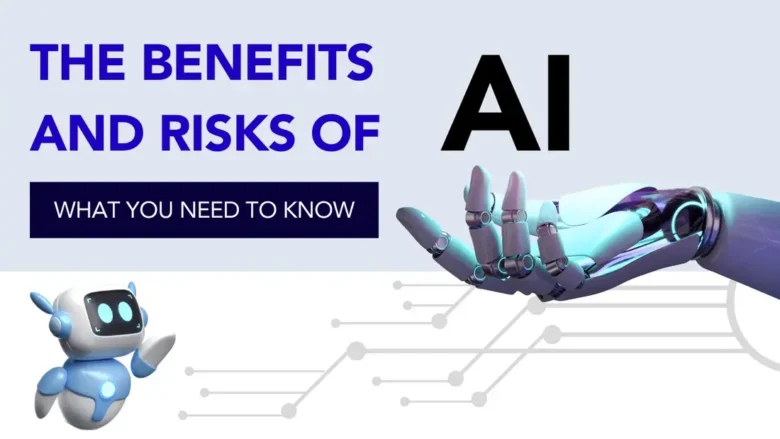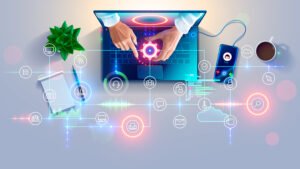Recently, artificial intelligence (AI) has evolved from a futuristic concept into a powerful force shaping our world today. From the way we work and communicate to shopping, travel, and even medical care, AI is embedded in every aspect of our daily lives. This technological revolution extends beyond IT companies, influencing education, healthcare, business, entertainment, and even our health.
AI makes many processes faster, smarter, and more efficient, but these developments also bring inevitable challenges and ethical questions. As society adapts to this digital transformation, it’s crucial to understand the benefits and risks of AI. By examining the current applications, potential benefits, and potential risks of AI, we can better navigate the fast-paced world of AI and prepare for the future with clarity and responsibility.
AI in Conversations and Interactions:
AI platforms have dramatically changed the way we communicate with each other. Chatbots, virtual assistants, and translation technologies enable people to connect seamlessly across borders. Social media sites use AI to filter content, recommend posts, and customize feeds. This process not only influences how we consume information but also how we think. These AI systems make life easier, but they can also make it more difficult by spreading misinformation and reinforcing biases. One of the most important questions in the digital age is how we determine the right balance between real-world interactions and algorithm-driven engagement.
AI in Healthcare: Improving Diagnosis and Treatment
Healthcare is one of the most promising areas for AI, and its benefits are clear. AI is transforming patient care in countless ways, for example, by enabling early disease detection, analyzing medical images, and developing personalized treatment plans using predictive algorithms. AI robots assist surgeons in performing precision surgeries, while virtual care assistants help patients stay informed about their health. Despite these impressive developments, however, concerns remain about data privacy, biases in medical algorithms, and the availability of AI-driven healthcare. The challenge lies in ensuring that AI improves healthcare for everyone, rather than detracts from it.
AI in the Workplace and Business:
AI is transforming the way we work by automating mundane tasks, enabling predictive analytics, and driving data-driven decision-making. Currently, AI chatbots handle a large portion of customer service, and predictive AI systems are also crucial for industries like logistics and retail. In business, AI tools can help companies analyze customer behavior and improve the effectiveness of marketing campaigns. However, automation also raises concerns about job losses. As companies increasingly deploy AI, employees must learn new skills and better utilize technology to succeed in an increasingly technologically advanced job market.
AI in Learning and Education:
AI applications are also transforming the education sector. Adaptive learning platforms tailor courses to the needs of individual students, ensuring every student makes progress. AI systems that help instructors grade exams, assess student performance, and predict potential challenges are also significantly beneficial. The integration of AI has significantly improved distance learning technologies, making education accessible worldwide. However, the reliance on AI also raises questions about equity, as many parts of the world still lack straightforward access to this technology. Moreover, excessive use of AI in classrooms can hinder personalized instruction and emotional and cognitive development.
AI in Life and Entertainment:
AI algorithms shape the entertainment we enjoy daily. AI enhances the user experience by tailoring content to user preferences, such as Netflix recommendations and Spotify suggestions. Video games are increasingly using AI to make the experience more realistic and engaging. Smart home devices, including voice assistants, security cameras, and energy management systems, incorporate artificial intelligence to enhance safety and efficiency. However, these benefits come at a price: privacy. Smart devices collect and process enormous amounts of personal information. Finding a balance between personalization and privacy protection is crucial.
How AI Improves Our Daily Lives:
Artificial intelligence undoubtedly offers numerous benefits. It can improve efficiency, reduce human error, and enable immediate problem-solving. In medicine, it can detect diseases faster than doctors, saving lives. It fosters learning in schools that are accessible to everyone. It can also boost innovation and competitiveness in businesses. AI can also advance sustainable development initiatives by enabling smart devices to better utilize energy and protect the environment. Together, these benefits contribute to a smarter and more efficient society.
AI Risks and Ethical Issues:
While AI offers numerous benefits, it also carries significant risks. Key concerns include job losses, data breaches, algorithmic bias, and ethical issues. AI systems often lack clear decision-making mechanisms, making them difficult to hold accountable. Biased data can lead to unfair outcomes in areas such as hiring and law enforcement. Misuse of AI in surveillance or weapons systems would pose even greater challenges to society and the world. Therefore, establishing regulations, oversight, and responsible development of AI are crucial to mitigate these risks while simultaneously stimulating new ideas.
What Does the Future of AI Look Like?
Artificial intelligence (AI) will increasingly become part of everyday life over time, impacting every sector and aspect of our lives. In the future, self-driving cars, smart cities, robotics, and environmentally friendly technologies will continue to improve. These technologies have the potential to transform how we live and interact. Legislators, developers, and the public must collaborate to ethically regulate AI and make it accessible to everyone. By using AI responsibly, we can make significant progress and ensure that technology benefits society rather than controlling it.
Conclusion:
This isn’t a far-fetched idea; it’s already changing our daily lives. AI is opening up new possibilities in areas such as healthcare, communications, business, and education. At the same time, it’s also making things more difficult. AI has two sides: it can help us progress, but it can also be dangerous if we’re not careful. Increasing awareness, strengthening regulations, and developing new ideas are crucial to adapting to this new era. Our goal isn’t to fight AI but to use it in ways that improve our lives while simultaneously protecting people’s rights and aspirations. Understanding the advantages and disadvantages of AI empowers society to make informed decisions about its future. AI can remain an ally, not a threat.
FAQs:
1. How does AI impact our daily lives?
Smart assistants, personalized recommendations, healthcare monitoring, and workplace automation are all ways AI impacts daily life. These technologies make work faster and easier.
2. What are the main benefits of AI?
The main benefits of AI are efficiency, accuracy, personalization, and the ability to perform large-scale data analyses, enabling people across all sectors to make more informed decisions.
3. What are the dangers of AI?
The biggest concerns are job losses due to automation, privacy issues, algorithmic bias, lack of accountability, and the possibility of the technology being used for surveillance or security.
4. Does AI have the potential to replace all human jobs?
AI can perform many of the same tasks repeatedly, but it cannot completely replace human creativity, empathy, and critical thinking. Instead, it will change the nature of jobs and require new talent.
5. How can we ensure the responsible use of AI?
Society can promote the safe and inclusive use of AI by ensuring clear rules, ethical principles, and open AI systems, as well as by educating people about digital literacy.



